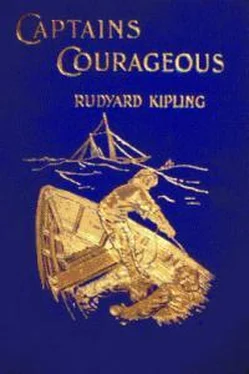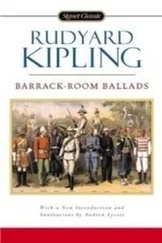"It will be hot," said Cheyne, as they rolled out of San Diego in the dawn of Sunday. "We're going to hurry, Mama, just as fast as ever we can; but I really don't think there's any good of your putting on your bonnet and gloves yet. You'd much better lie down and take your medicine. I'd play you a game of dominoes, but it's Sunday."
"I'll be good. Oh, I will be good. Only—taking off my bonnet makes me feel as if we'd never get there."
"Try to sleep a little, Mama, and we'll be in Chicago before you know."
"But it's Boston, Father. Tell them to hurry."
The six–foot drivers were hammering their way to San Bernardino and the Mohave wastes, but this was no grade for speed. That would come later. The heat of the desert followed the heat of the hills as they turned east to the Needles and the Colorado River. The car cracked in the utter drouth and glare, and they put crushed ice to Mrs. Cheyne's neck, and toiled up the long, long grades, past Ash Fork, towards Flagstaff, where the forests and quarries are, under the dry, remote skies. The needle of the speed–indicator flicked and wagged to and fro; the cinders rattled on the roof, and a whirl of dust sucked after the whirling wheels. The crew of the combination sat on their bunks, panting in their shirtsleeves, and Cheyne found himself among them shouting old, old stories of the railroad that every trainman knows, above the roar of the car. He told them about his son, and how the sea had given up its dead, and they nodded and spat and rejoiced with him; asked after "her, back there," and whether she could stand it if the engineer "let her out a piece," and Cheyne thought she could. Accordingly, the great fire–horse was "let 'ut" from Flagstaff to Winslow, till a division superintendent protested.
But Mrs. Cheyne, in the boudoir stateroom, where the French maid, sallow–white with fear, clung to the silver door–handle, only moaned a little and begged her husband to bid them "hurry." And so they dropped the dry sands and moon–struck rocks of Arizona behind them, and grilled on till the crash of the couplings and the wheeze of the brake–hose told them they were at Coolidge by the Continental Divide.
Three bold and experienced men—cool, confident, and dry when they began; white, quivering, and wet when they finished their trick at those terrible wheels—swung her over the great lift from Albuquerque to Glorietta and beyond Springer, up and up to the Raton Tunnel on the State line, whence they dropped rocking into La Junta, had sight of the Arkansaw, and tore down the long slope to Dodge City, where Cheyne took comfort once again from setting his watch an hour ahead.
There was very little talk in the car. The secretary and typewriter sat together on the stamped Spanish–leather cushions by the plate–glass observation–window at the rear end, watching the surge and ripple of the ties crowded back behind them, and, it is believed, making notes of the scenery. Cheyne moved nervously between his own extravagant gorgeousness and the naked necessity of the combination, an unlit cigar in his teeth, till the pitying crews forgot that he was their tribal enemy, and did their best to entertain him.
At night the bunched electrics lit up that distressful palace of all the luxuries, and they fared sumptuously, swinging on through the emptiness of abject desolation.
Now they heard the swish of a water–tank, and the guttural voice of a Chinaman, the click–clink of hammers that tested the Krupp steel wheels, and the oath of a tramp chased off the rear–platform; now the solid crash of coal shot into the tender; and now a beating back of noises as they flew past a waiting train. Now they looked out into great abysses, a trestle purring beneath their tread, or up to rocks that barred out half the stars. Now scour and ravine changed and rolled back to jagged mountains on the horizon's edge, and now broke into hills lower and lower, till at last came the true plains.
At Dodge City an unknown hand threw in a copy of a Kansas paper containing some sort of an interview with Harvey, who had evidently fallen in with an enterprising reporter, telegraphed on from Boston. The joyful journalese revealed that it was beyond question their boy, and it soothed Mrs. Cheyne for a while. Her one word "hurry" was conveyed by the crews to the engineers at Nickerson, Topeka, and Marceline, where the grades are easy, and they brushed the Continent behind them. Towns and villages were close together now, and a man could feel here that he moved among people.
"I can't see the dial, and my eyes ache so. What are we doing?"
"The very best we can, Mama. There's no sense in getting in before the Limited. We'd only have to wait."
"I don't care. I want to feel we're moving. Sit down and tell me the miles."
Cheyne sat down and read the dial for her (there were some miles which stand for records to this day), but the seventy–foot car never changed its long steamer–like roll, moving through the heat with the hum of a giant bee. Yet the speed was not enough for Mrs. Cheyne; and the heat, the remorseless August heat, was making her giddy; the clock–hands would not move, and when, oh, when would they be in Chicago?
It is not true that, as they changed engines at Fort Madison, Cheyne passed over to the Amalgamated Brotherhood of Locomotive Engineers an endowment sufficient to enable them to fight him and his fellows on equal terms for evermore. He paid his obligations to engineers and firemen as he believed they deserved, and only his bank knows what he gave the crews who had sympathized with him. It is on record that the last crew took entire charge of switching operations at Sixteenth Street, because "she" was in a doze at last, and Heaven was to help any one who bumped her.
Now the highly paid specialist who conveys the Lake Shore and Michigan Southern Limited from Chicago to Elkhart is something of an autocrat, and he does not approve of being told how to back up to a car. None the less he handled the "Constance" as if she might have been a load of dynamite, and when the crew rebuked him, they did it in whispers and dumb show.
"Pshaw!" said the Atchinson, Topeka, and Santa Fe men, discussing life later, "we weren't runnin' for a record. Harvey Cheyne's wife, she were sick back, an' we didn't want to jounce her. 'Come to think of it, our runnin' time from San Diego to Chicago was 57.54. You can tell that to them Eastern way–trains. When we're tryin' for a record, we'll let you know."
To the Western man (though this would not please either city) Chicago and Boston are cheek by jowl, and some railroads encourage the delusion. The Limited whirled the "Constance" into Buffalo and the arms of the New York Central and Hudson River (illustrious magnates with white whiskers and gold charms on their watch–chains boarded her here to talk a little business to Cheyne), who slid her gracefully into Albany, where the Boston and Albany completed the run from tide–water to tide–water—total time, eighty–seven hours and thirty–five minutes, or three days, fifteen hours and one half. Harvey was waiting for them.
After violent emotion most people and all boys demand food. They feasted the returned prodigal behind drawn curtains, cut off in their great happiness, while the trains roared in and out around them. Harvey ate, drank, and enlarged on his adventures all in one breath, and when he had a hand free his mother fondled it. His voice was thickened with living in the open, salt air; his palms were rough and hard, his wrists dotted with marks of gurrysores; and a fine full flavour of codfish hung round rubber boots and blue jersey.
The father, well used to judging men, looked at him keenly. He did not know what enduring harm the boy might have taken. Indeed, he caught himself thinking that he knew very little whatever of his son; but he distinctly remembered an unsatisfied, dough–faced youth who took delight in "calling down the old man," and reducing his mother to tears—such a person as adds to the gaiety of public rooms and hotel piazzas, where the ingenuous young of the wealthy play with or revile the bell–boys. But this well set–up fisher–youth did not wriggle, looked at him with eyes steady, clear, and unflinching, and spoke in a tone distinctly, even startlingly, respectful. There was that in his voice, too, which seemed to promise that the change might be permanent, and that the new Harvey had come to stay.
Читать дальше












